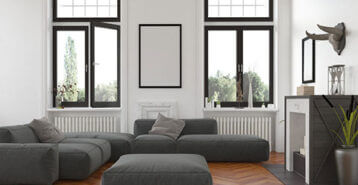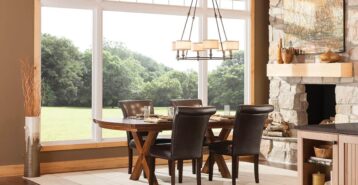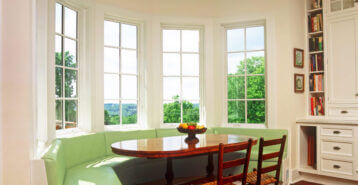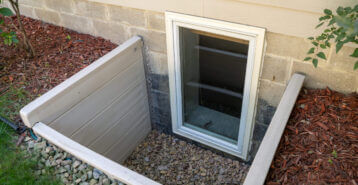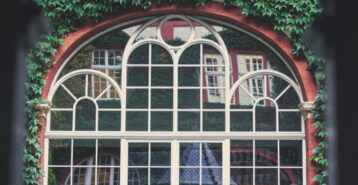What Is a Solar Tube?
A solar tube, also called a tubular skylight, sun tube skylight, sunlight tube, or skylight tunnel, is a type of natural lighting skylight designed to bring daylight into areas of your home where windows or traditional skylights aren’t practical. Unlike a full skylight, which requires cutting a large opening in the roof, a tubular skylight uses a small, weatherproof dome or lens on the roof to capture sunlight. That light travels down a highly reflective tunnel and disperses through a diffuser in the ceiling, brightening interior rooms with soft, natural light.
Tubular skylights are especially useful in bathrooms, hallways, closets, or kitchens that tend to feel dim. Homeowners often choose them because they deliver the benefits of natural light at a fraction of the cost of a conventional skylight, and they improve a home’s efficiency by reducing the need for electric lighting during the day.
Solar Tubes Cost
The national average cost of a tubular skylight installation falls between $600 and $1,000. On the low end, a basic 10-inch model with DIY installation may cost as little as $200 to $400. On the high end, professionally installed, larger-diameter tubes with extra features can reach $1,500 or more.
Cost Breakdown:
- Materials: Solar tubes themselves typically range from $200 to $600 depending on size and brand.
- Labor: Professional installation averages $400 to $700, but costs vary by region and roof complexity.
Factors That Affect Price:
- Tube Length and Diameter: Longer tunnels or larger sizes cost more.
- Roof Type: Steep or multi-layered roofs increase labor costs.
- Optional Features: Integrated night lights, daylight dimmers, or venting add to the total.
- Location: Homeowners in urban or high-cost labor markets may pay more than those in rural areas.
Over time, solar tubes can offset some of their cost by lowering electricity bills. Because this window type replaces artificial lighting with daylight, homeowners save on energy while enjoying a brighter, healthier living space.
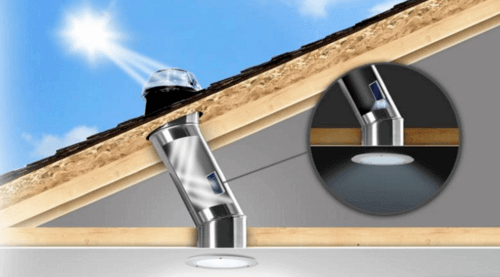
Types of Tubular Skylights
Not all solar tubes are the same. Options vary by window size, tunnel type, and roof compatibility:
- Diameter Sizes: Most solar tubes are available in 10-inch and 14-inch models. A 10-inch tube produces light comparable to three 100-watt bulbs and is ideal for bathrooms or hallways. A 14-inch tube can brighten up to 200 square feet, making it a good fit for kitchens or family rooms.
- Rigid vs. Flexible Tunnels: Rigid tubes maximize light transfer and are best when the path from the roof to the ceiling is clear. Flexible tubes, made of bendable reflective material, work around obstacles in the attic and simplify installation, though they provide slightly less light.
- Roof Compatibility: Some kits are designed for pitched roofs, while others are made for flat roofs. Choosing the right one ensures proper sealing and performance.
- Optional Features: Many homeowners opt for daylight dimmers, solar-powered night lights, or venting attachments that allow the skylight to double as an exhaust fan.
These options make tubular skylights versatile for a variety of spaces and budgets.
Cost by Tubular Skylight Brands
Several manufacturers produce reliable solar tube skylights, each offering different features and price points.
| Brand | Average Cost Range (Installed) | Notable Features |
|---|---|---|
| Solatube | $750 to $1,500 | Industry leader, innovative daylight dimmers, strong dealer network |
| VELUX | $650 to $1,200 | Known for skylights, offers both rigid and flexible models |
| Natural Light | $500 to $900 | Budget-friendly, ENERGY STAR® certified, DIY options |
| ODL | $550 to $950 | Sold at major retailers like Lowe’s and Home Depot, straightforward installation |
| Sun-Tek | $450 to $850 | Affordable, available in multiple sizes, basic but reliable |
When comparing brands, consider warranty coverage (some offer up to 20 years), availability of installers, and whether specialized accessories like night lights are included. Homeowners who prefer professional installation may gravitate toward Solatube or VELUX, while DIYers often choose Natural Light or ODL.
Tubular Skylights Pros and Cons
Pros:
- Cost-Effective: Much cheaper than traditional skylights.
- Energy Efficient: Reduces the need for electric lighting during the day.
- Easy Installation: Requires smaller roof openings and can often be completed in a few hours.
- Space-Friendly: Great for compact, windowless areas like closets, bathrooms, or hallways.
- Low-Maintenance: Once installed, requires minimal upkeep besides occasional cleaning of the roof dome.
Cons:
- Limited View: Unlike traditional skylights, tubular skylights don’t provide a sky view.
- Daylight Only: They cannot replace electric lighting at night (unless paired with a night-light kit).
- Size Limitations: Less effective in very large rooms that require broad light coverage.
- Potential Issues: Improper installation can lead to condensation or leaks.
- Roof Restrictions: Not always suitable for multi-story homes or complex rooflines.
For many homeowners, the pros far outweigh the drawbacks, especially in areas where natural light is scarce.
Are Tubular Skylights Worth It?
Whether a tubular skylight is worth the investment depends on your home and goals. If you’re looking for an affordable way to brighten dim spaces while lowering energy use, solar tubes are an excellent solution. They add value by making interior rooms more comfortable and appealing, and they often pay for themselves over time through energy savings.
Tubular skylights are especially worthwhile for:
- Eco-conscious homeowners who want to reduce electricity use.
- Budget-minded remodels that need a cost-effective skylight alternative.
- Homes with limited window options, such as interior bathrooms or hallways.
However, if your goal is to create an architectural feature, enjoy sky views, or brighten very large spaces, a traditional skylight may be the better option.
Overall, tubular skylights offer a practical, efficient, and affordable way to enjoy the benefits of natural daylight at home. For many households, they strike the right balance between cost and comfort — making them well worth considering for your next home improvement project.
Compare top-rated windows pros in your area.
Read real homeowner reviews, explore qualifications, and view promotions. Modernize makes it easy to browse professionals and find one that will be perfect for your project.





